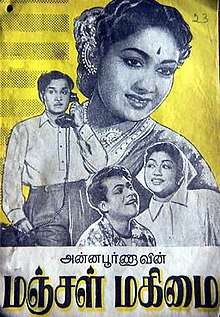Manjal Mahimai
| Manjal Mahimai | |
|---|---|
 | |
| Directed by | Adurthi Subba Rao |
| Produced by | D. Madhusudhana Rao |
| Written by | C. V. Sridhar (dialogues) |
| Screenplay by |
Adurthi Subba Rao D. Madhusudhana Rao Acharya Atreya |
| Story by | Ashapoorna Devi |
| Based on | Agni Pariksha |
| Starring |
Akkineni Nageswara Rao Savitri |
| Music by | Master Venu |
| Cinematography | P. S. Selvaraj |
| Edited by | A. Sanjeevi |
Production company | |
Release date |
|
Running time | 177 minutes |
| Country | India |
| Language | Tamil |
Manjal Mahimai (English: Power of Turmeric(Betrothal, Mangalyam), Turmeric is used as symbol of mangalyam) is a 1959 Indian Tamil-language romantic drama film, produced by D. Madhusudhana Rao under Annapurna Pictures and directed by Adurthi Subba Rao. Starring Akkineni Nageswara Rao, Savitri in the laed roles and music composed by Master Venu.[1] The film is based on Bengali film Agni Pariksha which was first remade in Telugu as Mangalya Balam; both the movies were made simultaneously by same banner & director and some of the scenes & artists are same in both versions. It was later remade in Hindi as Chhoti Si Mulaqat with slight changes, starring Uttam Kumar, Vyjayanthimala in pivotal roles[2]
Cast
Soundtrack
Music was composed by Master Venu. Lyrics were by Udumalai Narayana Kavi. Playback singers are Ghantasala, S. C. Krishnan, P. Suseela, Jikki & K. Jamuna Rani.
He borrowed only one tune from the Bengali film’s composer Anupam Ghatak, for the song "Kodai Maraindhaal Inbam Varum" from its original version "ke tumi amare dako".[3]
| No. | Song | Singers | Lyrics | Length (m:ss) |
| 1 | Anbinaal Ondrai Neengal | P. Suseela | 02:48 | |
| 2 | Aagaaya Veedhiyil Azhagaana Vennilaa | Ghantasala & P. Suseela | Udumalai Narayana Kavi | 04:46 |
| 3 | Thiruppadhi Vengkadesane | K. Jamuna Rani | ||
| 4 | Maaraadha Sogam Thaano | Ghantasala & P. Suseela | Udumalai Narayana Kavi | 03:21 |
| 5 | My Dear Meena Un Idea Enna | S. C. Krishnan, Jikki | Udumalai Narayana Kavi | 03:17 |
| 6 | Kodai Maraindhaal Inbam Varum | Ghantasala & P. Suseela | Udumalai Narayana Kavi | 03:17 |
| 7 | Aanadhu Aachu Ponadhu Pochu | S. C. Krishnan, Jikki | Udumalai Narayana Kavi | 03:08 |
| 8 | Idhuvenna Aanandhamo | P. Suseela | Udumalai Narayana Kavi | 03:24 |
Production
Bhavanarayana, producer of Meghasandesham suggested Dukkipati Madhusudhana Rao to watch the Bengali film Agni Pariksha (1954). Madhusudhana bought the remake rights after being impressed with the film and approached Atreya to write the screenplay and dialogues for the film. One of the major changes the maker brought in was while in the original version the girl’s father dies of shock, in Mangalyabalam his character was retained till the last frame. Mangalyabalam was said to be the first Telugu film to shoot in Ooty and it was also Savitri’s first visit to the hill town. The Tamil version Manjal Mahimai was simultaneously made retaining all the leading actors and technicians with two changes to the cast – Thangavelu and Balaji replacing Relangi and Ramanamurthy respectively.[3]
Release
Mangalyabalam was released on 7 January 1959 and for the first time in the history of Telugu cinema, the hundred days function was held in an open arena, the Municipal High School grounds, Vijayawada with thousands of cine fans participating and presided over by the then Chief Minister of Andhra Pradesh, Kasu Brahmananda Reddy. Tamil version Manjal Magimai was released on 14 January 1959 and ran for hundred days.[3]
Awards
References
- ↑ "Manjal Mahimai (Cast & Crew)". gomolo.com.
- ↑ "Manjal Mahimai (Review)". Spicy Onion.
- 1 2 3 "BLAST FROM THE PAST - Mangalyabalam (1959)". Hindu. Retrieved 9 October 2015.
- ↑ "6th National Film Awards". International Film Festival of India. Retrieved 3 September 2011.
- ↑ The Times of India directory and year book including who's who. Times of India Press. 1984